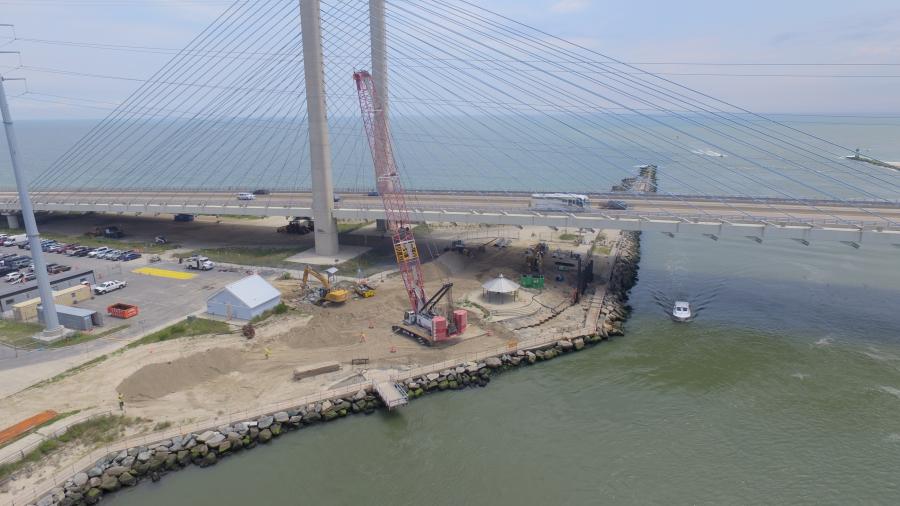
Photo courtesy of Army Corps of Engineers
The current work also will reinforce the shoreline for approximately 215 ft. on the north side of the inlet.
The Army Corps of Engineers has contracted Agate Construction to combat scour and a failing shoreline at the Indian River Inlet in Delaware. The Corps manages key water resources and infrastructure projects around the country, including work on rivers, dams, levees and bridges. Agate, located in nearby Cape May, N.J., specializes in heavy civil construction projects, often over water with tricky access.
A third key partner has been Vulcan Materials, whose quarry in Havre de Grace, Md., has provided the stone for the job.
Photo courtesy of Army Corps of Engineers
“I can’t say enough about the great cooperation we have received from Vulcan,” said Conor Teesdale, who is managing the project for Agate. “Communication between all of us has been vital as the project has been flowing smoothly with a target date of mid-2025 for finishing.”
The star of the show, a 300-ton Liebherr crane, looms over the project while the Route 1 Charles Cullen bridge, a cable-stayed structure, soars over the river a few yards away. A front loader fills the crane’s bucket with approximately 250 tons of rock per day, which the operator then directs over the river and dumps it precisely into the water where it will strengthen and armor the inlet slope.
“We often have to operate from barges on other projects, so having the crane on land makes this job easier,” said Teesdale.
The casual observer on the banks of the inlet sees a load of rock being dumped into a swiftly flowing Indian River. In reality, the dumps are being done with great precision.
“Our Autocad program inside our trailer shows us precisely where the loads should go,” said Teesdale. “The individual rocks in the bucket range from 150 pounds to 3,000 pounds. Those rocks will fit with the riprap already in place. This is a mixed blend of rock. Then, capstones weighing three to five tons will be placed on top to seal everything in place.”
The work team is carefully managing the behemoth that is dumping the rock into the Inlet. When winds off the nearby beach kick up to 25 mph, the crew must carefully monitor the swing of the boom. At 35 mph, the crew shuts the crane down. The controls in the cab prevent the boom from extending too high and striking the overhead power lines.
The Indian River and Bay is an expansive estuary system approximately 15 mi. long. The coastal inlet where it meets the ocean experiences swift tidal currents, which make the seafloor and adjacent shorelines susceptible to scour and erosion. The bulkheads and rock armoring the inlet are popular fishing areas while the oceanfront areas are popular with swimmers and surfers.
Steve Rochette of the Army Corps of Engineers, sees this project as necessary.
“This is an important spot for recreation in Delaware, and it needed repairs as the shoreline and walkway were failing and collapsing and getting progressively worse,” he said.
The construction team is placing the stone to armor the slope, driving steel sheet piles and installing a post and panel wall system to further reinforce the shoreline. The post and panel wall system consists of H-pile posts driven 60 ft. with 20-ft. sheet pile lagging in between. Then, the rock supports these structures.
Photo courtesy of Army Corps of Engineers
Rochette also described a separate repair to reinforce and sand tighten a portion of the jetty for approximately 215 ft. on the south side of the inlet.
The crew managed the timing of the work around environmental windows to minimize impacts to fish.
The Corps is continuing to investigate repairs to the nearby North Jetty structure of the inlet and has partnered with the state of Delaware to help manage erosion on the oceanfront shoreline.
A team of approximately a dozen workers, engineers and supervisors are on the site daily.
Safety has been a focal point during construction given the popularity of the area.
“We’ve worked closely with Delaware State Parks on site safety and to minimize nearby parking/vehicle disruptions as we know this is a very popular area for so many,” said Rochette. CEG
Chuck MacDonald
Chuck MacDonald is an editor, blogger and freelance feature writer whose writing adventures have taken him to 48 states and 10 countries. He has been the editor for magazines on pavement construction, chemicals, insurance and missions. Chuck enjoys bicycling, kayaking and reading. He graduated from the University of Missouri with a degree in journalism. Chuck lives in Annapolis, Md. with his wife Kristen. They have seven grandchildren.
Read the full article here